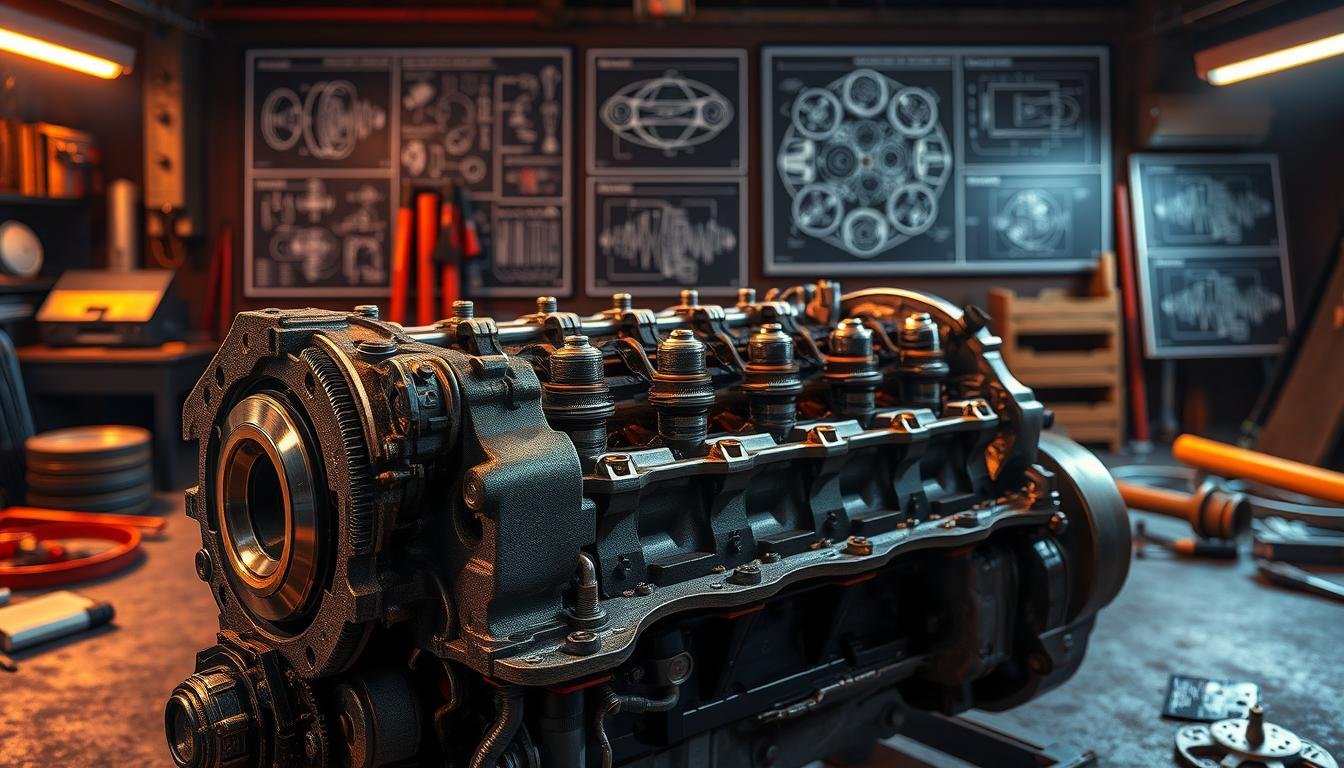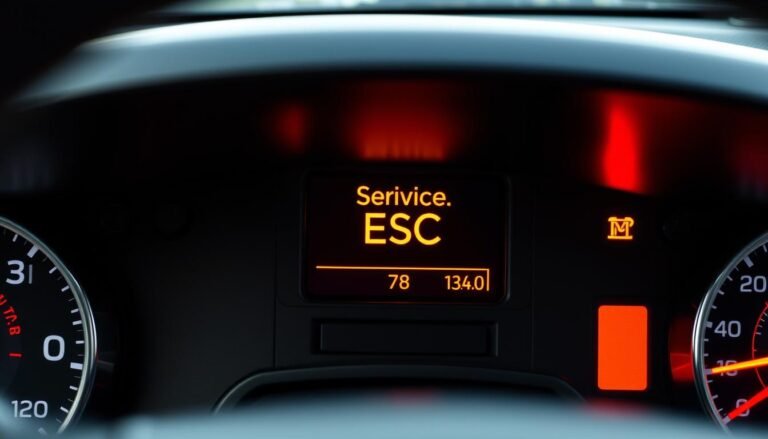Chevy Traverse Engine Problems: Common Issues
The Chevy Traverse engine problems can slow down your car. This is true for models from 2009-2014 and 2017-2024.
As a family-friendly midsize SUV, the Traverse has plenty of space. But, it faces issues with engine reliability. Knowing these common problems is key.
It helps you spot trouble early, avoiding expensive repairs. We will cover the top engine problems of the Traverse, including warning signs.
We’ll also discuss why engines fail, and how this affects your car. By using our guide, you can figure out if you need to act fast or just see a mechanic.
Whether you fix cars yourself or prefer a pro, being prepared helps you take good care of your SUV.
Introduction To The Chevy Traverse
The Chevy Traverse first came out in 2008 and quickly became a favorite for families. It can seat up to eight people and is budget-friendly.
These characteristics helped it stand out in the crowded SUV market. Since its launch, the Traverse has seen a lot of improvements.
The 2018 and 2024 redesigns made it even more appealing. These updates brought in the newest technology and safety features.
They aim to make driving and riding in the Traverse more enjoyable. Even though the Traverse is known for being a great family SUV, some older models had engine issues.
It’s important for buyers to know about the Traverse’s features and potential problems. This knowledge will help you decide if it’s the right choice for your family’s travel needs.
What is Common Issues with Chevy Traverse Engine?
The Chevy Traverse is loved for its comfort and utility. But, it often faces certain engine problems that can hurt its performance.
Knowing about these issues is key for keeping your car running safely and smoothly.
Overview of Common Engine Problems
Some common problems include using too much oil, the engine stalling, and check engine lights that won’t go away. These are mostly seen in the 2010 and 2011 models.
Using too much oil means you have to fill up more often, which costs money and can harm your engine. Engine stalling usually happens at low speeds, which can be risky.
Also, if your check engine light keeps coming on, it might mean a big problem needs fixing.
Impact of Common Issues on Vehicle Performance
These engine troubles can really affect your car’s performance. For example, using too much oil can strain the engine. This might cause bigger problems down the line.
Stalling can also make driving unsafe because it can happen when speeding up or turning.
It’s important to take care of these problems quickly. Doing so keeps your Traverse working well for a long time.
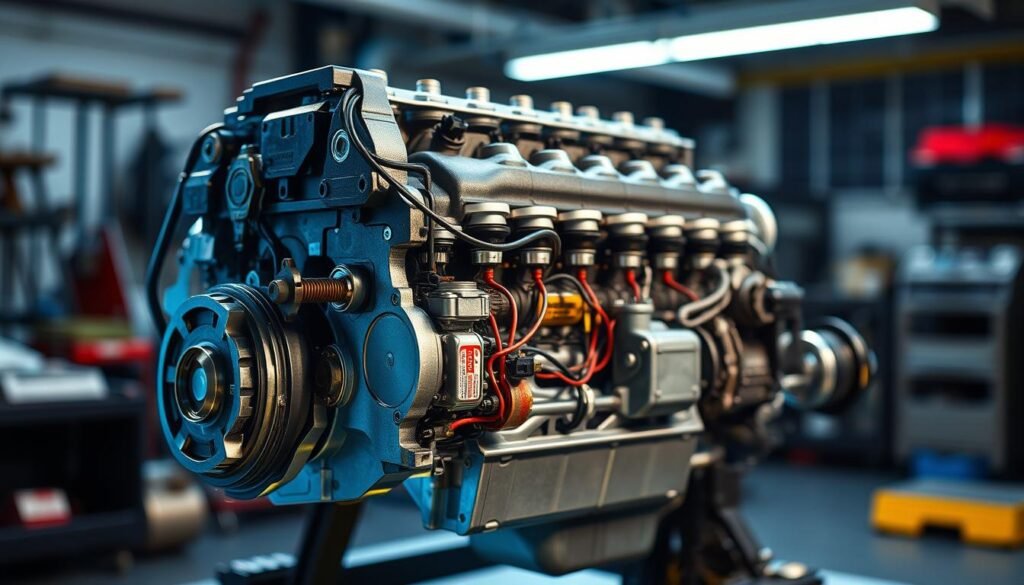
Chevy Traverse Engine Problems and Their Symptoms
Knowing the Chevy Traverse engine problems early can save you time and money. Look out for engine stalling and high oil use. These are big red flags of deeper issues.
Identifying Engine Stalling and Shuddering
Many Chevy Traverse owners have had engine stalling issues. It mostly happens at low speeds, which is risky. If your car stops suddenly or hesitates, check it out fast.
Ignoring these signs can make things worse. Your car’s performance and safety might suffer.
Signs of Excessive Oil Consumption
Watch out for your Chevy Traverse using too much oil. Key signs include needing frequent oil top-offs and smelling burning oil.
The 2010 and 2011 models are especially known for this. If you’re always checking your oil, it’s time to get expert help.
Check Engine Light: What Does it Mean?
The check engine light is a signal you shouldn’t ignore. It tells you there’s a problem, like emissions issues or a bad oxygen sensor.
Get it checked quickly to avoid bigger, more expensive problems. Keeping an eye on your engine’s symptoms will help you catch issues before they get worse.
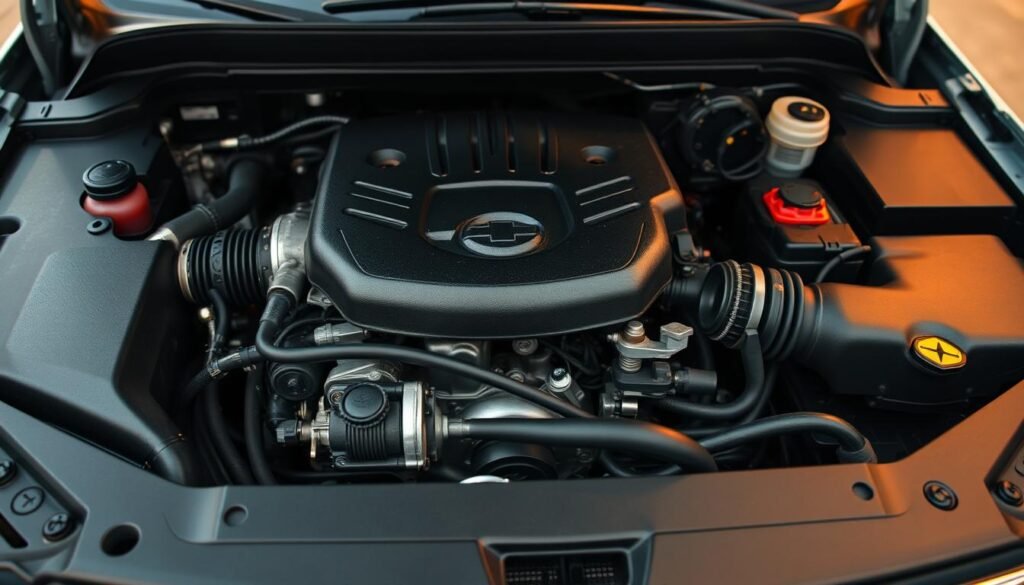
Diagnosing Chevy Traverse Engine Failure
It’s important to know how to figure out Chevy Traverse engine failure. This helps keep the car running well and safely. Engine issues can pop up for many reasons.
They might get worse if the car is not taken care of properly. Catching these issues early can save money and keep you safe on the road.
Knowing what often goes wrong with the engine helps spot problems early. This way, you can get them fixed quickly.
Common Causes of Engine Failure
Some usual reasons why Chevy Traverse engines fail include:
- Worn bearings leading to insufficient lubrication.
- Timing chain failures, especially prevalent in earlier model years.
- Overheating due to coolant leaks or failed water pumps.
- Oil sludge buildup from infrequent oil changes.
- Faulty spark plugs affecting ignition.
How To Test For Engine Problems?
To find out what’s wrong with the engine, you can:
- Conduct a visual inspection of engine oil levels and check for leaks.
- Use an OBD-II scanner to read error codes that may indicate specific issues.
- Check for unusual noises or vibrations when the engine runs.
- Monitor engine temperature during operation to ensure it stays within limits.
Keeping up with regular maintenance helps spot problems early. This means you can fix things before your Chevy Traverse has serious issues.
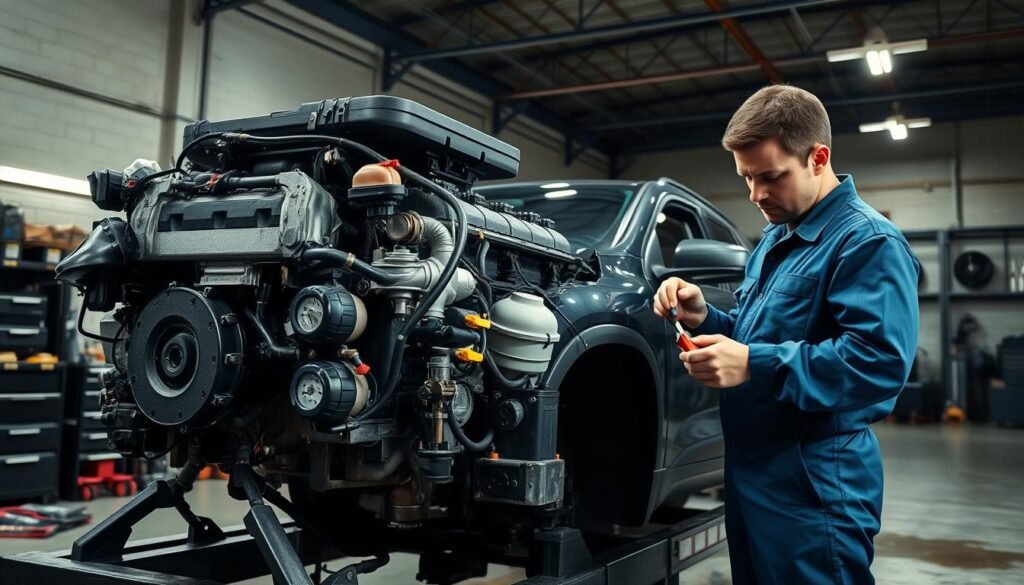
Transmission Issues as Related To Engine Performance
Chevy Traverse models from 2009 to 2014 often have transmission troubles, like slipping and hard shifting.
These issues can greatly affect your car’s engine performance. Spotting these problems early is key to avoiding expensive fixes.
Transmission Slipping and Hard Shifting
If your transmission slips, you might feel your car lose power when speeding up or have trouble switching gears. Hard shifting can make your car jerk as it moves between gears.
These signs suggest your transmission could be in big trouble. Not fixing these issues can cost you more than $3,000 in repairs.
Signs of Transmission Failure
- Delayed gear engagement when shifting
- Unusual noises such as grinding or whining
- Fluid leaks underneath the vehicle
- Warning lights on the dashboard indicating a problem
- Burnt smell from the transmission fluid
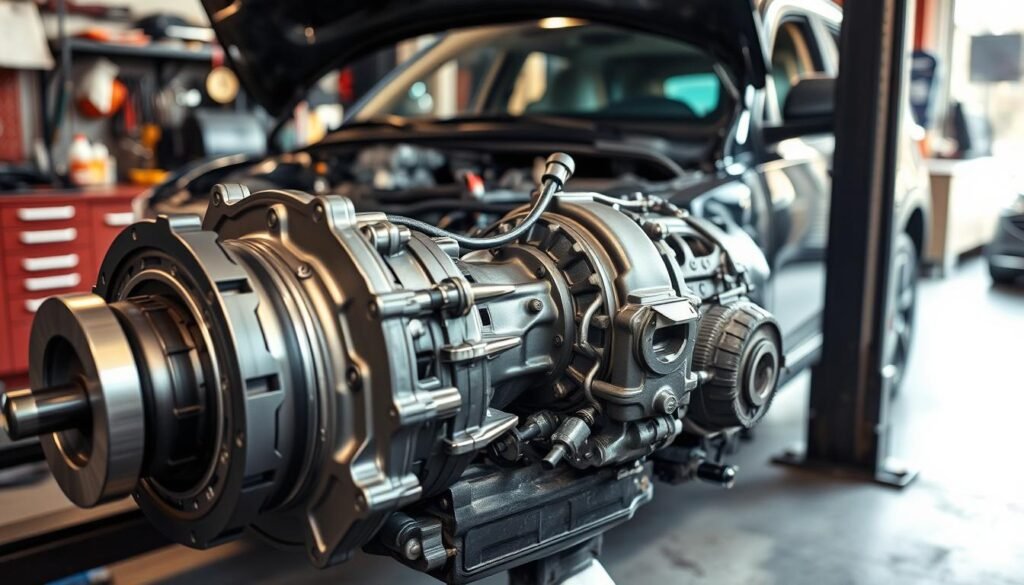
Troubleshooting Chevy Traverse Engine Problems
To tackle Chevy Traverse engine troubles, start by ensuring the oil level is right. Then, check for any leaks in hoses or connections.
Also, make sure the battery is healthy and functioning well. If problems continue, use an OBD-II scanner to identify specific issues through error codes.
Step-by-Step Troubleshooting Guide
- Check oil levels and top off if necessary.
- Inspect for fluid leaks under the vehicle.
- Examine battery connections and ensure they are secure and free of corrosion.
- Utilize an OBD-II scanner to read diagnostic trouble codes.
- Investigate the codes to identify potential problems.
- Monitor symptoms while performing road tests to detect changes.
When To Seek Professional Help?
If you’ve tried fixing your Chevy Traverse engine issues without success, it may be time for expert help.
A skilled mechanic can diagnose the problem thoroughly. They’ll offer the right solutions based on their expertise.
Chevy Traverse Engine Recall Information
The Chevy Traverse has faced various engine concerns, leading to recalls. Some recalls focused on safety, but issues, especially in 2010 and 2011 models, were missed.
Knowing about past recalls and checking for new ones is key to keeping your vehicle safe and reliable.
Past Engine Recalls and Their Impact
Significant safety risks caused Chevy Traverse engine recalls. These recalls mainly targeted parts that could fail or be hazardous.
It’s important to keep up with recalls for your car year to prevent potential problems.
How To Check For Active Recalls?
It’s easy to check for active recalls on your Chevy Traverse. Go to the National Highway Traffic Safety Administration (NHTSA) website for your car’s info.
Just put your VIN in the search spot. You’ll see if your model has any recalls and what steps to take next.
How To Fix Chevy Traverse Engine Problems?
Fixing engine problems early keeps your Chevy Traverse running well. Follow maintenance tips to lessen the chance of big engine troubles.
Doing regular check-ups makes sure your vehicle stays reliable and saves you money later.
Maintenance Tips To Prevent Engine Issues
Maintaining a good maintenance routine is key to avoiding Chevy Traverse engine problems. Here’s what you should do:
- Change oil every 5,000 to 7,500 miles for the best engine health.
- Regularly check important fluid levels like coolant, brake fluid, and transmission fluid.
- Change air filters as advised to keep the engine breathing right.
- Look at belts and hoses for wear and tear and replace if necessary.
- Keeping an eye on tire pressure and condition ensures safe driving and fuel efficiency.
Common Repair Costs and Solutions
Knowing repair costs helps you plan for engine troubles. Engine problems can be expensive, sometimes costing as much as $6,300.
Here’s what common repairs might cost you:
| Type of Repair | Estimated Cost |
|---|---|
| Engine Replacement | $5,000 – $6,300 |
| Fuel Injector Replacement | $300 – $600 |
| Timing Chain Replacement | $1,000 – $2,500 |
| Head Gasket Replacement | $1,200 – $2,000 |
By following maintenance tips and being ready for repair costs, you can keep your Chevy Traverse lasting longer. Acting quickly on issues helps keep your vehicle in top shape.
Chevy Traverse Engine Reliability Ratings
The Chevy Traverse shows different levels of engine reliability through the years. This info helps potential buyers and current owners make smart choices about care and fixes.
It’s vital to look at model year differences to judge performance and dependability accurately.
Model Year Comparisons
| Model Year | Reliability Rating | Common Issues |
|---|---|---|
| 2009-2012 | Below Average | Engine stalling, oil consumption |
| 2013-2014 | Average | Transmission problems |
| 2015 | Average | Electrical system issues |
| 2016-2018 | Above Average | Minor complaints, improved design |
| 2019-2024 | High | Fewer reported issues |
Factors Affecting Reliability
Many factors influence the Chevy Traverse’s reliability. Important ones include:
- Engine design and materials used
- Advancements in technology over the years
- Consumer feedback and reported experiences
- Regular maintenance practices
Consumer Experiences with Chevy Traverse Engine Issues
Talking to real Chevy Traverse owners, we learn a lot about engine problems. Many owners talk about issues like using too much oil and the engine shutting down suddenly.
These comments show the common troubles and what people dealing with them feel, helping both new and current owners know what might come up.
Owner Reviews and Feedback
Owners share their stories, and they often sound similar:
- Oil Consumption: Lots of owners find their Traverse uses more oil than they thought it would. They have to fill it up more often.
- Engine Stalling: Some have had their engines stop working while driving, which can be really risky.
- Maintenance Transparency: A bunch of drivers like knowing what could go wrong with their engines. They try to stay ahead with regular check-ups.
Insights From Mechanics and Experts
Experts in car repair give useful advice for Traverse owners. They commonly say:
- Early Diagnosis: Catching engine issues early on can save a lot of hassle and money down the line.
- Regular Maintenance: Keeping up with engine check-ups can prevent bigger problems later.
- Customer Communication: Talking openly with your mechanic means better care for engine troubles.
Conclusion
Compromise Chevy Traverse engine issues is key to better vehicle care. Early recognition of problems like engine stalling, too much oil use, and the check engine light is crucial.
It leads to timely fixes and a better driving experience. To avoid Chevy Traverse engine problems, stay aware and informed.
Regular maintenance and knowing when to get expert help are important. Doing so helps you prevent engine failures.
Knowing how to deal with engine problems is your strongest shield against sudden car troubles. Being informed gives you the confidence to handle any issues with ease.
FAQs
What are the common engine problems reported for the Chevy Traverse?
Common issues include too much oil use, the engine stopping or shaking, and lots of check engine lights. This is especially true for the 2010-2011 models.
What symptoms indicate excessive oil consumption in the Chevy Traverse?
Symptoms include needing to add oil often, smelling burning oil, and seeing oil leaks.
How can I diagnose engine stalling issues in my Chevy Traverse?
To figure out why your engine stalls, check how much oil you have and look for leaks. Use an OBD-II scanner to find error codes that could tell you what’s wrong.
Are there major recalls related to the Chevy Traverse engine?
While some recalls have been issued for serious safety issues, many engine problems in the 2010 and 2011 models haven’t been recalled. Always look on the NHTSA website for the latest information.
What maintenance tips can help prevent engine issues in the Traverse?
Doing regular maintenance like changing oil on time, checking fluid levels, and changing air filters can stop engine problems. It’s important to deal with any issues early on.
How much can engine repairs for the Chevy Traverse cost?
Fixing the engine can be expensive, with costs for severe damage going up to ,300. The price changes based on the problem and what repairs are needed.
What factors affect the reliability ratings of the Chevy Traverse?
Reliability scores depend on engine design, material quality, feedback from customers, and how many engine problems are reported by year.
When should I seek professional help for engine problems in my Traverse?
If you can’t fix the problem yourself or notice serious issues like the engine often stalling, see a mechanic for a detailed check-up.

